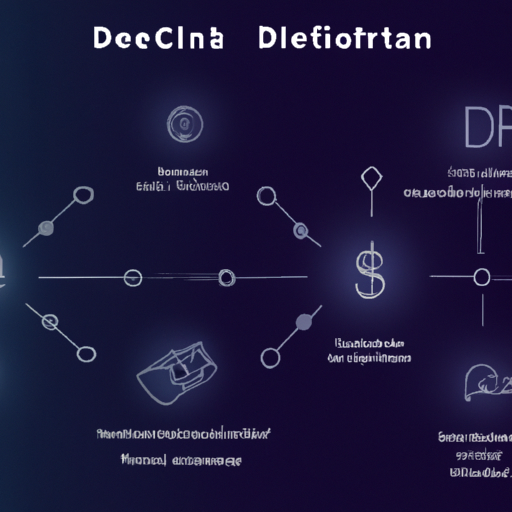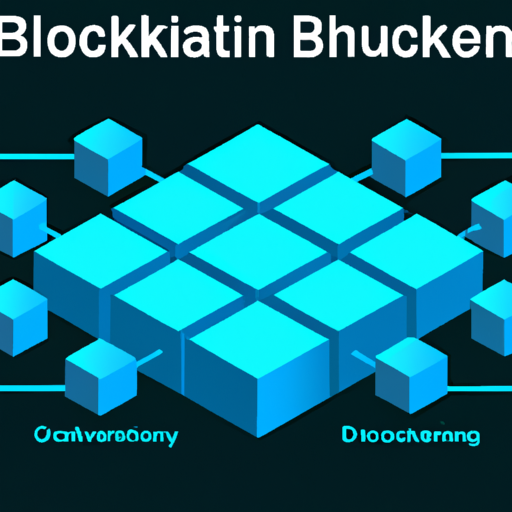-
Table of Contents
- Introduction
- Exploring the Potential of DeFi for Financial Inclusion and Accessibility
- Examining the Regulatory Challenges of DeFi and Blockchain-Based Financial Products
- Analyzing the Impact of DeFi on Traditional Financial Markets
- Understanding the Risks and Rewards of Investing in DeFi Products
- Exploring the Benefits of Decentralized Finance (DeFi) for Financial Institutions
- Conclusion
“Unlock the Power of DeFi: Unlock Your Financial Freedom with Blockchain-Based Financial Products.”
Introduction
Decentralized finance (DeFi) is a rapidly growing sector of the blockchain-based financial industry. It is a new type of financial system that is built on top of blockchain technology and is designed to be open, transparent, and secure. DeFi is a way to access financial services without the need for a centralized authority or intermediary. It enables users to access a wide range of financial products and services, such as lending, borrowing, trading, and insurance, without the need for a bank or other traditional financial institution. DeFi is also a way to create new financial products and services that are not available in the traditional financial system. By leveraging the power of blockchain technology, DeFi is revolutionizing the way people access and use financial services.
Exploring the Potential of DeFi for Financial Inclusion and Accessibility
The emergence of decentralized finance (DeFi) has opened up a world of possibilities for financial inclusion and accessibility. DeFi is a rapidly growing sector of the cryptocurrency industry that is revolutionizing the way people access and use financial services.
DeFi is a form of financial technology that uses blockchain technology to create a decentralized, open-source financial system. This system is designed to be more secure, transparent, and accessible than traditional financial systems. It allows users to access financial services without the need for a centralized authority or intermediary.
DeFi has the potential to revolutionize the way people access and use financial services. It can provide access to financial services to those who are traditionally excluded from the traditional banking system. This includes people in developing countries, those with limited access to banking services, and those who are unbanked or underbanked.
DeFi can also provide access to financial services to those who are unable to access traditional banking services due to high fees or lack of access. DeFi can provide access to financial services at a fraction of the cost of traditional banking services. This can help to reduce the cost of accessing financial services and make them more accessible to those who are unable to access traditional banking services.
DeFi can also provide access to financial services to those who are unable to access traditional banking services due to lack of trust in the system. DeFi is built on a trustless system, meaning that users do not need to trust a third party to access financial services. This can help to reduce the risk of fraud and increase the security of financial transactions.
Finally, DeFi can provide access to financial services to those who are unable to access traditional banking services due to lack of knowledge or understanding of the system. DeFi is designed to be user-friendly and easy to use, making it accessible to those who may not have the knowledge or understanding of traditional banking systems.
In conclusion, DeFi has the potential to revolutionize the way people access and use financial services. It can provide access to financial services to those who are traditionally excluded from the traditional banking system, those who are unable to access traditional banking services due to high fees or lack of access, those who are unable to access traditional banking services due to lack of trust in the system, and those who are unable to access traditional banking services due to lack of knowledge or understanding of the system. DeFi can help to reduce the cost of accessing financial services and make them more accessible to those who are unable to access traditional banking services.
Examining the Regulatory Challenges of DeFi and Blockchain-Based Financial Products
The emergence of decentralized finance (DeFi) and blockchain-based financial products has created a new wave of opportunities for investors and entrepreneurs alike. However, these new technologies also present a unique set of regulatory challenges. In this article, we will explore the regulatory landscape surrounding DeFi and blockchain-based financial products, and discuss the potential implications for the industry.
The first challenge is the lack of a unified regulatory framework. As DeFi and blockchain-based financial products are still relatively new, there is no single set of regulations that govern them. This means that different countries and jurisdictions may have different rules and regulations, making it difficult for companies to operate across borders. Additionally, the lack of a unified framework makes it difficult for regulators to monitor and enforce compliance.
The second challenge is the lack of consumer protection. As DeFi and blockchain-based financial products are not subject to the same consumer protection laws as traditional financial products, investors may be exposed to greater risks. This is especially true for products that are not backed by a central authority, such as decentralized exchanges. Additionally, the lack of consumer protection may lead to increased fraud and manipulation.
The third challenge is the lack of transparency. As DeFi and blockchain-based financial products are not subject to the same disclosure requirements as traditional financial products, investors may not have access to the same level of information. This can make it difficult for investors to make informed decisions, and may lead to increased market volatility.
Finally, the fourth challenge is the lack of liquidity. As DeFi and blockchain-based financial products are still relatively new, there is limited liquidity in the market. This can make it difficult for investors to enter and exit positions, and may lead to increased price volatility.
Overall, the emergence of DeFi and blockchain-based financial products presents a unique set of regulatory challenges. As the industry continues to evolve, it is important for regulators to develop a unified framework that can ensure consumer protection, transparency, and liquidity. Only then can the industry reach its full potential.
Analyzing the Impact of DeFi on Traditional Financial Markets
The emergence of decentralized finance (DeFi) has had a significant impact on traditional financial markets. DeFi is a form of financial technology that operates on a blockchain network and is not subject to the same regulations as traditional financial markets. This has enabled DeFi to offer a range of services, such as lending, borrowing, and trading, that are not available in traditional markets.
The impact of DeFi on traditional financial markets can be seen in several areas. Firstly, DeFi has enabled users to access financial services without the need for a centralized intermediary. This has allowed users to access services such as lending and borrowing without the need for a bank or other financial institution. This has enabled users to access services that were previously only available to those with access to traditional financial markets.
Secondly, DeFi has enabled users to access services that are not available in traditional markets. For example, DeFi has enabled users to access services such as automated market making, which is not available in traditional markets. This has enabled users to access services that were previously only available to those with access to traditional financial markets.
Thirdly, DeFi has enabled users to access services that are not available in traditional markets at a lower cost. This has enabled users to access services such as lending and borrowing at a lower cost than what is available in traditional markets. This has enabled users to access services that were previously only available to those with access to traditional financial markets.
Finally, DeFi has enabled users to access services that are not available in traditional markets in a more secure manner. This has enabled users to access services such as lending and borrowing in a more secure manner than what is available in traditional markets. This has enabled users to access services that were previously only available to those with access to traditional financial markets.
Overall, the emergence of DeFi has had a significant impact on traditional financial markets. DeFi has enabled users to access services that were previously only available to those with access to traditional financial markets. This has enabled users to access services such as lending and borrowing at a lower cost and in a more secure manner than what is available in traditional markets. As DeFi continues to grow, it is likely that its impact on traditional financial markets will continue to increase.
Understanding the Risks and Rewards of Investing in DeFi Products
Investing in decentralized finance (DeFi) products can be a lucrative endeavor, but it is important to understand the risks and rewards associated with such investments. DeFi products are digital assets that are built on blockchain technology and are designed to provide financial services such as lending, borrowing, and trading.
The potential rewards of investing in DeFi products are significant. These products offer investors the opportunity to earn high returns on their investments, as well as access to a wide range of financial services. Additionally, DeFi products are often more liquid than traditional investments, meaning that investors can quickly and easily convert their investments into cash.
However, it is important to understand the risks associated with investing in DeFi products. These products are highly volatile and can be subject to rapid price fluctuations. Additionally, DeFi products are not regulated by any government or financial institution, meaning that investors may not have the same protections as they would with traditional investments. Furthermore, DeFi products are often built on complex technology, and there is a risk that the underlying code may contain bugs or vulnerabilities that could lead to financial losses.
It is important for investors to understand the risks and rewards associated with investing in DeFi products before making any decisions. Investors should research the product thoroughly and understand the technology behind it before investing. Additionally, investors should diversify their investments and only invest what they can afford to lose. By understanding the risks and rewards associated with DeFi products, investors can make informed decisions and maximize their potential returns.
Exploring the Benefits of Decentralized Finance (DeFi) for Financial Institutions
The emergence of decentralized finance (DeFi) has revolutionized the financial services industry, offering a range of benefits to financial institutions. DeFi is a form of financial technology that operates on a decentralized, open-source platform, allowing users to access financial services without the need for a centralized authority.
One of the primary benefits of DeFi for financial institutions is the ability to reduce costs. By utilizing a decentralized platform, financial institutions can reduce the costs associated with maintaining a centralized infrastructure. This can result in significant cost savings, as well as improved efficiency and scalability. Additionally, DeFi can provide financial institutions with access to a larger pool of potential customers, as it is not limited to a single jurisdiction or region.
DeFi also offers financial institutions the ability to access a wider range of financial services. By utilizing a decentralized platform, financial institutions can access a range of services, such as lending, trading, and asset management. This can provide financial institutions with a competitive edge, as they can offer a wider range of services than traditional financial institutions.
Furthermore, DeFi can provide financial institutions with increased security and privacy. By utilizing a decentralized platform, financial institutions can ensure that their data is secure and private. This can help to protect customer data and reduce the risk of fraud and other malicious activities.
Finally, DeFi can provide financial institutions with increased transparency. By utilizing a decentralized platform, financial institutions can ensure that all transactions are visible and traceable. This can help to reduce the risk of fraud and other malicious activities, as well as provide customers with greater confidence in the financial institution.
In conclusion, DeFi offers a range of benefits to financial institutions, including cost savings, access to a wider range of services, increased security and privacy, and increased transparency. As such, DeFi is an attractive option for financial institutions looking to improve their operations and provide their customers with a better experience.
Conclusion
Decentralized finance (DeFi) and blockchain-based financial products have the potential to revolutionize the way we manage our finances. By providing a secure, transparent, and efficient platform for financial transactions, DeFi and blockchain-based financial products can help to reduce costs, increase access to financial services, and create new opportunities for individuals and businesses alike. As the technology continues to evolve, we can expect to see more innovative and secure financial products emerge, furthering the potential of DeFi and blockchain-based financial products.




